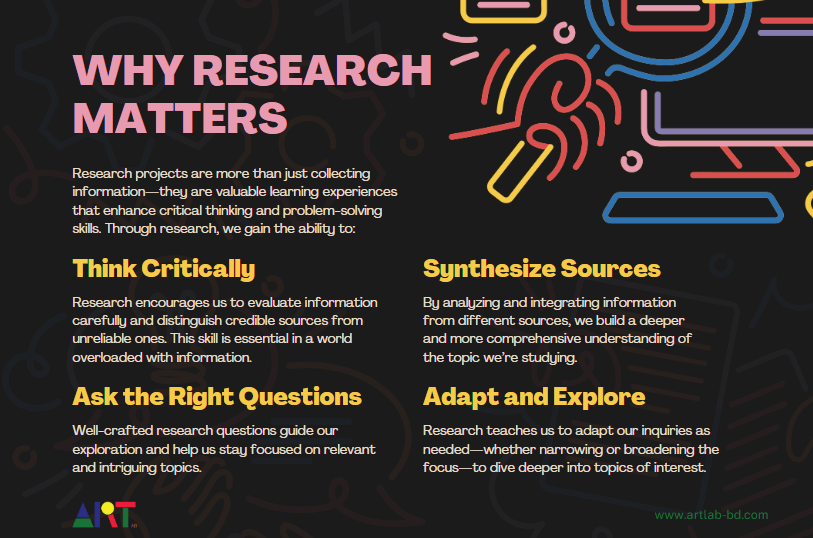
At ART Lab, we believe that research is more than just an academic requirement—it’s a powerful tool for personal, intellectual, and societal growth. In a world overflowing with information, the ability to question, analyze, and synthesize is more important than ever. Research teaches us how to think, not what to think. It sharpens our curiosity, fuels innovation, and empowers learners of all ages to become problem-solvers and independent thinkers.
More Than Just Information
Many people associate research with piles of books or hours spent on Google. But research isn’t just about collecting information—it’s about developing understanding. At its core, research is a process of exploration. It allows us to ask meaningful questions, discover patterns, connect ideas, and make informed decisions.
Whether it’s a student working on a school project, an artist diving into cultural history, or a professional developing a new product—research gives us the tools to approach challenges with confidence and creativity.
The Power of Critical Thinking
One of the most valuable skills research helps us develop is critical thinking. In the digital age, we are constantly bombarded with content—news, opinions, ads, and misinformation. Research helps us pause, evaluate, and ask: Is this information reliable? What evidence supports this claim? Through this process, we learn how to distinguish fact from fiction and make choices that are informed and responsible.
Critical thinking is not just an academic skill—it’s a life skill. From daily decisions to career-defining strategies, the ability to think clearly and critically is a foundation for success.
Asking the Right Questions
Every great discovery starts with a great question. Research teaches us how to ask the right questions—ones that are specific, focused, and rooted in curiosity. These questions guide our inquiry, helping us stay on track and uncover deeper truths.
At ART Lab, we encourage learners to frame their own questions and explore topics that truly interest them. This personalized approach not only boosts motivation but also leads to more meaningful and lasting learning experiences.
Making Sense of Information
Another key benefit of research is learning how to synthesize sources. With so much information available, it’s not enough to just collect data—we must also make sense of it. Research helps us combine insights from different perspectives to build a comprehensive and nuanced understanding of a topic.
This process teaches us how to connect the dots, identify patterns, and form conclusions based on evidence. It’s a skill that translates across disciplines—from science and history to art and technology.
The Art of Adaptability
Research also teaches us how to adapt and explore. Sometimes we start with one question, only to find that our investigation leads us in a new direction. This flexibility is a strength, not a weakness. It shows that we’re willing to learn, grow, and respond to new information.
At ART Lab, we encourage learners to be bold and open-minded in their research journey. Whether they need to narrow their focus or broaden their scope, we support their process every step of the way.
Creating Lifelong Learners
Ultimately, research fosters a mindset of curiosity and continuous learning. It empowers students to take ownership of their education, pursue their passions, and contribute meaningfully to the world around them. It prepares future leaders, innovators, and changemakers who aren’t afraid to ask tough questions or seek thoughtful answers.
At ART Lab, we are proud to nurture a culture where research is not just encouraged—it’s celebrated. Through workshops, creative projects, and collaborative exploration, we help learners of all backgrounds become confident researchers and lifelong learners.
Ready to explore your curiosity?
Join us at ART Lab and discover how research can transform the way you think, learn, and grow.
#ARTLab #ResearchMatters #CriticalThinking #LifelongLearning #EducationForAll #YouthEmpowerment #CreativeEducation

